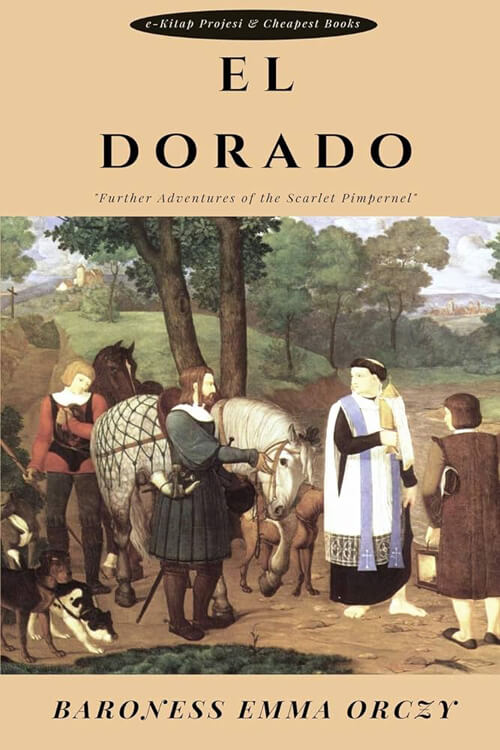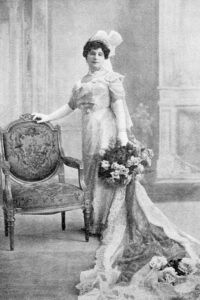
El Dorado: An Adventure of the Scarlet Pimpernel
Yet, people found the opportunity to amuse themselves, dance, go to the theatre, enjoy music, and enjoy open-air cafes and promenades in the Palais Royal.
New dress fashions appeared, and milliners produced fresh “creations,” and jewellers were not idle. A grim sense of humour, born of the intensity of ever-present danger, had dubbed the cut of sure tunics “tete tranche,” or a favourite ragout was called “a la guillotine.”
The theatres closed their doors on three evenings only during the past memorable four and a half years. These evenings were the ones immediately following that terrible 2nd of September, the day of the butchery outside the Abbaye prison when Paris herself was aghast with horror. The cries of the massacred might have drowned the calls of the audience, whose hands upraised for plaudits would still be dripping with blood.
On all other evenings of these same four and a half years, the theatres in the Rue de Richelieu, the Palais Royal, the Luxembourg, and others raised their curtains and took money at their doors. The same audience that earlier in the day had whiled away the time by witnessing the ever-recurrent dramas of the Place de la Revolution assembled here in the evenings and filled stalls, boxes, and tiers, laughing over the satires of Voltaire or weeping over the sentimental tragedies of persecuted Romeos and innocent Juliets.
Death knocked at so many doors these days! He was so constant a guest in the houses of relatives and friends that those who had merely shaken him by the hand, those on whom he had smiled, and whom he, still smiling, had passed indulgently by, looked on him with that subtle contempt born of familiarity, shrugged their shoulders at his passage, and envisaged his probable visit on the morrow with lighthearted indifference.
Paris—despite the horrors that had stained her walls had remained a city of pleasure, and the knife of the guillotine scarcely descended more often than did the drop scenes on the stage.
On this bitterly cold evening of the 27th Nivose, in the second year of the Republic—or, as we of the old style persist in calling it, the 16th of January, 1794—the auditorium of the Theatre National was filled with a very brilliant company.
Read or download Book
Baroness Emmuska Orczy
Baroness Emma Orczy (full name: Emma Magdalena Rozália Mária Jozefa Borbála Orczy de Orci) ( 23 September 1865 – 12 November 1947), usually known as Baroness Orczy (the name under which she was published) or to her family and friends as Emmuska Orczy, was a Hungarian-born British novelist and playwright.
Biography.
She is best known for her series of novels featuring the Scarlet Pimpernel, the alter ego of Sir Percy Blakeney, a wealthy English fop who turns into a quick-thinking escape artist to save French aristocrats from “Madame Guillotine” during the French Revolution, establishing the “hero with a secret identity” in popular culture. Opening in London’s West End on 5 January 1905, The Scarlet Pimpernel became a favourite of British audiences. Some of Orczy’s paintings were exhibited at the Royal Academy in London. She established the Women of England’s Active Service League during World War I to empower women to convince men to enlist in the military.
Orczy was born in Tarnaörs, Hungary. She was the daughter of the composer Baron Félix Orczy de Orci (1835–1892) and Countess Emma Wass de Szentegyed et Cege (1839–1892). Her paternal grandfather, Baron László Orczy (1787–1880) was a royal councilor, and knight of the Sicilian order of Saint George, her paternal grandmother, Baroness Magdolna, born Magdolna Müller (1811–1879), was of Austrian origin. Her maternal grandparents were Count Sámuel Wass de Szentegyed et Cege (1815–1879), a member of the Hungarian parliament, and Rozália Eperjessy de Károlyfejérvár (1814–1884). Emma’s parents left their estate for Budapest in 1868, fearful of the threat of a peasant revolution. They lived in Budapest, Brussels, and Paris, where Emma studied music unsuccessfully. Finally, in 1880, the 14-year-old Emma and her family moved to London, England, where they lodged with their countryman, Francis Pichler, at 162 Great Portland Street. Orczy attended the West London School of Art and then the Heatherley School of Fine Art. Although not destined to be a painter, it was at art school that she met a young illustrator named Henry George Montagu MacLean Barstow, the son of an English clergyman; they were married at St Marylebone parish church on 7 November 1894. It was the start of a happy marriage, which she described as “for close on half a century, one of perfect happiness and understanding, perfect friendship and communion of thought.”






